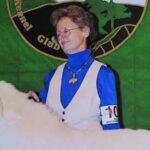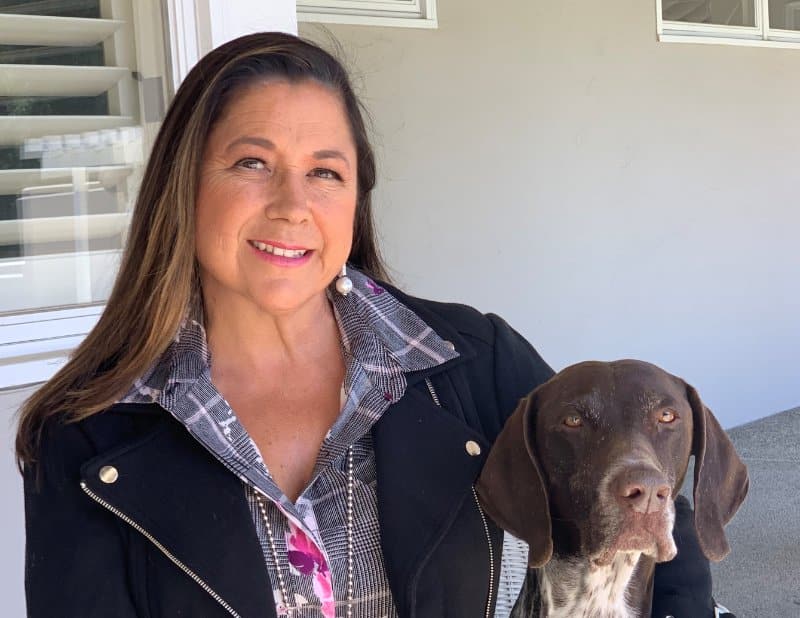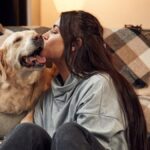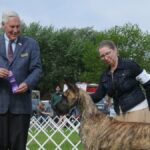Interview with Valerie Nunes-Atkinson, Breeder behind the VJK-MYST Kennels
Where do I live? How many years in dogs? How many years as a breeder?
Valerie Nunes-Atkinson: Proudly, I’m a second-generation breeder. My father, Chuck Nunes, started our line in 1971 under the prefix of Von Jango. My father got into Cutting Horses when I was a young teen. I continued on in the breed with my first breed mentor, Marilyn Stockland, co-breeding with her. I’ve been a breeder for around 45 years myself.
What is my kennel name? How many dogs do I currently keep?
Valerie Nunes-Atkinson: I carried on with Von Jango and Marilee (Marilyn Stockland’s kennel name) for some years. It wasn’t until Marilyn Stockland passed away that I forged a partnership with my co-breeder, Yvonne Hassler-Deterding, and we became VJK-MYST in around 1999.
We don’t keep a large kennel. In fact, we consider ourselves quite small. We instead prefer to co-own our dogs out so that they lead full, complete lives with families of their own. In my home at the present, I have my current young special, “Phoenix,” and two young bitches, “Ember” and “Jilly.” Yvonne has a couple young dogs we are running on and a handful of retirees… oh, and her husband Steve’s gundog.
Which show dogs from the past have been my noteworthy winners?
Valerie Nunes-Atkinson: “CJ” and “Carlee” are probably my two most noteworthy winners who most have known. Both were awarded Best in Show at the Westminster KC, in 2016 & 2005. More recently, “Jade” also won the Sporting Group at Westminster KC in 2021.
“Toby,” NSC CH Minado’s Parade Drum Major ROMXX HOF, bred by Inge and Leanne Clody of Minado Kennels and owned by myself and the late Barbara Caron, was the most noteworthy dog not only in my breeding program and pedigrees but for so many other lines worldwide as well. Toby is the ALL-TIME TOP PRODUCING SIRE IN OUR BREED HISTORY IN THE WORLD. He has played a significant role in my dogs, with him usually the sire, grandsire, or great-grandsire of so many of our top dogs, including those mentioned above.
Which have been my most influential sires and dams?
Valerie Nunes-Atkinson: When you look at great pedigrees and the traditional ideas of breeding dogs, having a strong female line is usually the practice. Although we have had some amazing bitches that have done well for us, it’s really our sire line that is significant; with Toby always the anchor of the line. CJ has also followed in Toby’s strong ability to be quite prepotent and come through in a variety of lines whether he’s linebred or outcrossed.
Again, the bitches that have done well for us are usually the daughters, granddaughters, or great-granddaughters of Toby or CJ.
Can I talk a bit about my facilities? Where are my puppies whelped? How are they raised?
Valerie Nunes-Atkinson: Our facilities are our homes. The dogs are raised in our homes with our families. Yvonne does have a small kennel building, but all dogs are raised and kept in a more home-oriented manner, with all litters whelped and raised in our homes with us and with 24/7 care and handling. Like I mentioned before, we consider ourselves a small kennel. Traditionally, we breed just a litter a year as we breed for ourselves and our vision, first and foremost. So, every generation is critical for us moving our program forward.
What is my “process” for selecting Show Puppies? Performance Puppies? Field Puppies?
Valerie Nunes-Atkinson: We select our babies at 7-1/2 weeks for Show, Field or Companion. That process starts quite young as we start to have a good idea of temperaments and structure once they start getting up on their legs and bouncing around. Around 5-6 weeks, we start table-training them to better see their conformation potential and we introduce the bird wing to allow their natural instinct
to ignite.
Do I compete in Companion Events? Performance Events?
Valerie Nunes-Atkinson: We do enjoy both Hunt Tests and Natural Ability Testing through NAVHDA and feel it’s important to prove our dogs and maintain the natural hunting instinct. We have enjoyed and titled our dogs in Obedience, Agility, Rally, Dock Diving, Fast CAT, Barn Hunt, Trick Dog, CGC, and so much more. Our breed is a very unique breed as they were bred to be the dog that can be anything and do anything that their owners desire.
Are Field Trials or parent club Hunt Tests important to me?
Valerie Nunes-Atkinson: I think, to maintain type and natural ability, proving your lines in Field Events is important. That’s not to say that to own a GSP your dog must hunt. Our breed is amazing at using its incredible scenting abilities to aid in Police & Border Protection, as Service Dogs, and always as great family dogs.
How would I define “conditioning” as it relates to my breed?
Valerie Nunes-Atkinson: Conditioning our breed is easy. Given space and time, they naturally keep themselves in excellent condition. Our breed is a high-energy breed and does need a release of sorts, and so a dedicated and consistent effort is needed to keep them well balanced. This doesn’t mean they require 10 miles of running every day. What it does mean is they need training early on and they need consistency in what is asked of them.
They are German, strong-willed, and actually thrive under conditions that have set strong ground rules through training. Keeping the balance can be done through physical exercise and mental exercise; both work quite well and it should be a combination of effort. They do want to please and work for their owners. The owners just need to put the effort in and they will have a wonderful family dog. In regards to traditional conditioning, keeping a quality coat is easy with a premium food, some oils, and protein. Other than nails, teeth, and ears, our breed is quite easy to maintain.
Are there any health-related concerns in your breed? Any special nutritional needs?
Valerie Nunes-Atkinson: Our breed is considered a healthy breed overall, in my opinion. Like so many other breeds, epilepsy, hemangiosarcoma, and various cancers have crept into our breed in the last couple decades; something we are all concerned about and do our best to breed healthy, long-lived dogs. Our breed does enjoy a long life, and living 14-16 years is not unheard of. Right now, we call Yvonne’s house our geriatric ward, with many over 12 and on up to 16 years of age.
We do believe in a low protein diet through early growth stages, but traditionally our breed’s nutritional needs are easy and basic. Quality food, basic ground rule training, companionship and love, and consistent exercise both in body and mind are all that is needed to keep a GSP thriving as your companion.
Do I think my breed is supported by a sufficient number of preservation breeders?
Valerie Nunes-Atkinson: Yes, I think we have some fabulous preservation breeders who do an outstanding job breeding quality GSPs that are true to TYPE in conformation, hunting ability and companionship. And it’s nice to see some younger breeders stepping up and finding mentorship, and who are enthusiastic to carry on breeding quality dogs.
Is my breed well suited to be a family dog? Who are the best candidates to own my breed?
Valerie Nunes-Atkinson: YES, our breed makes ideal family dogs. The well-bred GSP is even-tempered, loving, and protective of their family in a non-aggressive manner. They generally get along well with other dogs and make the perfect family dog for people who enjoy adventure and the outdoors. A GSP is always up for anything and can do it all. I like to say, “If you can dream it, they can do it.” Truly a remarkable breed.
What is the biggest misconception about my breed? What is my breed’s best-kept secret?
Valerie Nunes-Atkinson: The biggest misconception is that they are hyper, destructive, and can’t be contained. Unfortunately, this is seen in what many backyard breeders produce from unproven, non-health tested dogs with zero mentorship and/or a breeder guarantee. Our dogs are strong, confident animals that thrive under the same type of ownership. Our best-kept secret is the fact that they are not just hunting dogs. What’s amazing is truly all that they can do. Any sport or activity you enjoy, they can do it.
If I could share a comment or two with judges of my breed, what would I like to say to them?
Valerie Nunes-Atkinson: I always tell judges that our breed is easy to judge. Our Breed Standard is basic and straightforward, especially in comparison to so many other Standards. We are a medium-sized breed that should be athletes in every sense of the word, with the ability to move and cover ground efficiently. They should be in great physical condition and hard in muscle. They should exhibit keenness, a smart, rich, aristocratic look and demeanor that tells a person they are willing and able to get it done. We are not a “head breed” and we are not a breed that requires full dentition. Our Standard requires you look at the sides not for full dentition, but to make sure the molars intermesh properly.
Do I have any words of wisdom to pass along to newer breeders? Words of wisdom?
Valerie Nunes-Atkinson: Study pedigrees and the Standard. Know the history of the breed and its intention. Find a mentor and ask questions. Develop your eye and what you like and want in your dogs. Take your time. Find the very best linebred bitch you can find to start a program of your own. Mentors, pedigrees, and knowing your Standard are key to success. Oh, and time. It all takes time to develop not only a line but a family of dogs that will depict your vision. Be patient and keep working at it, generation by generation.
For a bit of fun, what’s the most amusing thing I’ve ever experienced with a Sporting Dog?
Valerie Nunes-Atkinson: Most amusing? GSPs are clowns. They love to make you laugh. They are always doing things that bring a smile, like having to carry anything in their mouths. This could be a ball or maybe the biggest dog bed they can find close to them. Sticks, too, the bigger the better, or toys also, the louder the better. My new young dog, “Phoenix,” loves bath tubs. He must get in and inspect every tub, listening to the drain like someone is calling him.
Are you looking for a German Shorthaired Pointer puppy?
The best way to ensure a long and happy relationship with a purebred dog is to purchase one from a responsible breeder. Not sure where to begin finding a breeder?
Contact the National Parent Club’s Breeder Referral person, which you can find on the AKC Breeder Referral Contacts page.
Want to help rescue and re-home a German Shorthaired Pointer dog?
Did you know nearly every recognized AKC purebred has a dedicated rescue group? Find your new best friend on the AKC Rescue Network Listing.
German Shorthaired Pointer Breed Magazine
Showsight Magazine is the only publication to offer dedicated Digital Breed Magazines for ALL recognized AKC Breeds.
Read and learn more about the German Shorthaired Pointer dog breed with articles and information in our German Shorthaired Pointer Breed Magazine.
Error embedding FlippingBook shortcode, please check the flipbook url. (https://digital.showsightmagazine.com/view/676036/)
If you enjoy the German Shorthaired Pointer Breed Magazine, help us educate the community by sharing it.








